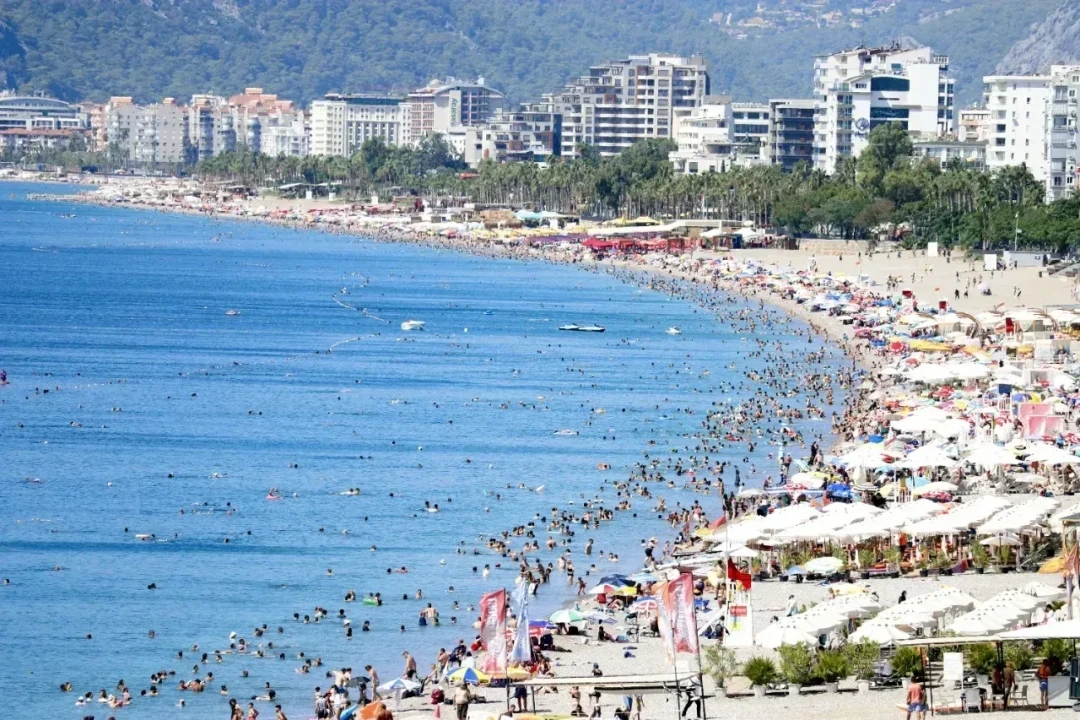In Alanya, the sea water temperature has exceeded 30 degrees Celsius

In the Mediterranean, where a record temperature of 28 degrees was measured last year, a temperature exceeding 32 degrees was recorded as of August 12 this year. In Alanya, located in the Mediterranean region, the highest temperature recorded was 30.7 degrees.
According to August measurements by the General Directorate of Meteorology, a record temperature of 32.2 degrees was observed in Adana Karataş in the Eastern Mediterranean. For the first time, sea water temperatures have surpassed 32 degrees. According to the August measurement results, temperatures were 31.9 degrees at the Mersin-Akdeniz Işıklı Buoy, 31.6 degrees in Mersin-Newşehir, 31.5 degrees in Hatay İskenderun, 30.8 degrees in Antalya-Kemer, 30.8 degrees in Muğla-Fethiye, 30.7 degrees at the new marina main breakwater in Antalya-Alanya, and exceeded 30 degrees in Antalya-Muratpaşa. Other high-temperature points in the Mediterranean included Kaş (29.5 degrees), Finike (29.3 degrees), Alanya (29.1 degrees), and Silifke (29 degrees).
SIGNIFICANT RISK FOR THE ECOSYSTEM
For the Mediterranean, where 28 degrees was once considered a high temperature, the fact that sea water temperatures have exceeded 30 degrees is seen as a significant risk to the ecosystem. The record temperatures in the Mediterranean have also shown similar increases in the Aegean, Marmara, and Black Seas.
AEGEAN SEA REACHED 29 DEGREES
According to sea water temperature measurements, 29 degrees was recorded in Aydın Didim. In Çanakkale-Biga, the temperature reached 28.6 degrees, in İzmir-Konak 28.5 degrees, in İzmir-Dikili 27.7 degrees, and in Gökçeada 27.6 degrees, marking record temperatures for the Aegean Sea. In the Sea of Marmara, temperatures reached 28.3 degrees at the Istanbul Airport Lighthouse station, 28 degrees at the Silivri main breakwater lighthouse, and 27.9 degrees in Yalova. In the Black Sea, the highest temperature was 28.1 degrees at the Giresun Palamut-Kayalık Lighthouse station, with 27.8 degrees in Zonguldak, and 27.5 degrees in Artvin-Hopa, Sinop, and Samsun-Atakum.
SHARING THE PLANET WILL BECOME MUCH MORE DIFFICULT
Prof. Dr. Barış Önol from the Istanbul Technical University’s Department of Meteorological Engineering highlighted the new record increases in sea water temperatures following warnings of a very hot summer and subsequent hot autumn. Evaluating the maps shared by the European Centre for Medium-Range Weather Forecasts (ECMWF), Prof. Dr. Önol stated, "Waters in the Persian Gulf are warming up. Yes, in the forecasts for next week, sea water temperatures are reaching 36 degrees. All our Mediterranean coasts will endure 32 degrees. The heatwave next week will test us again. In the future, sharing the planet will be much more difficult."
DISRUPTION OF THE ECOSYSTEM'S NATURAL CYCLE
Dr. Erol Kesici, scientific advisor to the Turkish Nature Conservation Association (TTKD), pointed out that the increase in temperature could create serious nutritional problems for organisms with increased environmental resistance. He noted that changes brought about by rising temperatures will have an entirely opposite effect on the natural balance of the world and regions. Particularly, he emphasized that the future of the world is under significant threat. Dr. Kesici warned:
"Due to rising temperatures, negative conditions in water, land, and air are affecting ecological balance and biodiversity. One of the most important indicators is that temperature increases can lead to changes in the living, growth, and reproduction environments of species from warmer habitats. These increases can cause the disappearance of the living environments of these species, leading to migrations and intensified competition for food and oxygen. As the population numbers approach the carrying capacity, the growth rate of populations slows down due to increased environmental resistance. Losses in the ecosystem disrupt the balance and result in an increase in virus-related diseases. The reduction of water and food resources, deforestation, desertification, glacier melting, thermal expansion of sea water, salinization of water sources, and increases in diseases transmitted by water and food, among other issues, disrupt the natural cycle of the ecosystem. This can lead to the extinction of life in that environment."


